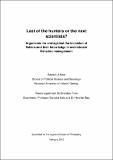| dc.contributor.advisor | Flynn, Brendan | |
| dc.contributor.author | Hind, Edward Jeremy | |
| dc.date.accessioned | 2012-11-01T09:43:38Z | |
| dc.date.available | 2012-11-01T09:43:38Z | |
| dc.date.issued | 2012-02-27 | |
| dc.identifier.uri | http://hdl.handle.net/10379/3022 | |
| dc.description.abstract | The concept of fishers' knowledge is one that has largely been marginalised in mainstream fisheries management, often characterised by soft ecological narratives and social insights when the bias of fisheries managers is for hard quantitative data of a biological nature.
This thesis makes an original contribution firstly, by situating the debate on the contested concept of fishers' knowledge within the political context of traditional fisheries science, which has been undergoing a paradigm crisis and demands for reform.
Secondly, I draw a broad conceptual difference between a reformist account of fishers' knowledge and a more radical discourse which positions fishers' knowledge as an alternative to scientific enquiry. It is argued that a radical approach would be misguided, because fishers' knowledge is not as effective as scientific data for assessing fish stocks. Instead, a case is made to continue to use fishers' knowledge to explain remaining uncertainties in scientific stock assessment, and to explore important aspects of a fishery that other research approaches cannot. Specifically, it should become one of the central information pillars for conducting ecosystem-based fisheries management. Additionally, I advance fishers' strategies as a developing concept that if understood, could for the first time allow managers to comprehend not just 'how' fishing effort occurs, but 'why'.
Through a detailed analysis of a rich case study on the west coast of Ireland, these arguments are fleshed out to show how and why the concept of fishers' knowledge may be relevant for resolving serious problems in fisheries politics and policy.
More broadly the thesis covers new ground in areas of study relating to local and experiential knowledge, ecosystem-based management and the political dimensions of environmental sustainability and natural resource management. It would be an interesting point of reference for professionals researching these topics. | en_US |
| dc.rights | Attribution-NonCommercial-NoDerivs 3.0 Ireland | |
| dc.rights.uri | https://creativecommons.org/licenses/by-nc-nd/3.0/ie/ | |
| dc.subject | Fishers' knowledge | en_US |
| dc.subject | Fishers' strategies | en_US |
| dc.subject | Fisheries management | en_US |
| dc.subject | Local ecological knowledge | en_US |
| dc.subject | Ireland | en_US |
| dc.subject | Stock assessment | en_US |
| dc.subject | Ecosystem-based fisheries management | en_US |
| dc.subject | Galway Bay | en_US |
| dc.subject | Aran Islands | en_US |
| dc.subject | Political Science and Sociology | en_US |
| dc.title | Last of the hunters or the next scientists? Arguments for and against the inclusion of fishers and their knowledge in mainstream fisheries management | en_US |
| dc.type | Thesis | en_US |
| dc.contributor.funder | The Marine Institute | en_US |
| dc.local.note | This thesis is a study of Irish fishers and their considerable knowledge. It proves that fishers have a large role to play in the future of Irish fisheries management. Scientists and policy-makers can use fishers' knowledge to make fisheries more sustainable, both from an ecological and cultural perspective. | en_US |
| dc.local.final | Yes | en_US |
| nui.item.downloads | 3356 | |


